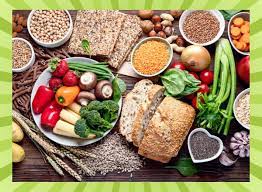Hey guys, we have good news for you today, the 6 Best Roughages that can boost your health, this is a good secret that can help boost your immune system to be able to defend your body cells properly.
In today’s fast-paced world, where convenience often takes precedence over nutrition, the importance of roughages in our diet cannot be overstated. Roughages, also known as dietary fiber, are the indigestible parts of plant foods that promote digestive health, aid in weight management, regulate blood sugar levels, and support overall well-being. In this article, we will explore the top 6 roughages that can significantly boost your health. By understanding their benefits and learning how to incorporate them into your diet, you can embark on a journey towards better health and vitality. Let’s dive in and discover the transformative power of these nutrient-packed roughages.
Roughages
Roughages, also known as dietary fiber or roughage, are the indigestible parts of plant-based foods. Unlike other nutrients such as carbohydrates, proteins, and fats, roughages pass through the digestive system relatively intact, providing a range of health benefits along the way. Roughages can be classified into two main types: soluble fiber, which dissolves in water and forms a gel-like substance, and insoluble fiber, which does not dissolve in water and adds bulk to the stool. Both types of fiber are essential for maintaining digestive health, promoting regular bowel movements, and supporting overall well-being. Roughages are found in fruits, vegetables, whole grains, legumes, nuts, and seeds, and incorporating them into your diet can have numerous positive effects on your health, including improved digestion, weight management, and reduced risk of chronic diseases such as heart disease and diabetes.
Health importance of Roughages
Here are few health benefits of roughages in your diet:
- Improved Digestive Health: Roughages add bulk to stool, promoting regular bowel movements and preventing constipation.
- Weight Management: High-fiber foods help you feel full for longer periods, reducing overall calorie intake and aiding in weight loss or weight maintenance efforts.
- Blood Sugar Regulation: Soluble fiber slows down the absorption of sugar, helping to regulate blood sugar levels and reducing the risk of insulin resistance and type 2 diabetes.
- Heart Health: Roughages can help lower cholesterol levels by binding to cholesterol particles and carrying them out of the body, thus reducing the risk of heart disease and stroke.
- Prevention of Diverticular Disease: Adequate fiber intake can prevent diverticula, small pouches that can form in the colon and lead to diverticular disease, including diverticulitis and diverticulosis.
- Reduced Risk of Hemorrhoids: Fiber helps prevent hemorrhoids by softening stool and reducing strain during bowel movements.
- Detoxification: Roughages aid in detoxification by promoting regular elimination of waste and toxins from the body.
- Improved Gut Microbiome: Fiber serves as a prebiotic, nourishing beneficial bacteria in the gut and promoting a healthy balance of gut flora.
- Reduced Risk of Colorectal Cancer: Adequate intake of roughages is associated with a decreased risk of colorectal cancer, as fiber helps move waste through the colon more quickly, reducing exposure to potentially harmful substances.
- Increased Satiety and Reduced Cravings: High-fiber foods can help control appetite and reduce cravings for unhealthy snacks, contributing to better overall dietary choices and weight management.
Incorporating roughages into your diet can have a multitude of positive effects on your health, making them an essential component of a balanced and nutritious eating plan.
6 Best Roughages that can boost your health
Leafy greens,
such as spinach, kale, Swiss chard, and collard greens, are nutritional powerhouses packed with essential vitamins, minerals, and fiber. Here are some key health benefits of leafy greens:
- Rich in Nutrients: Leafy greens are low in calories but high in nutrients, including vitamins A, C, K, and folate, as well as minerals like calcium, iron, and magnesium. These nutrients are essential for maintaining overall health and vitality.
- High Fiber Content: Leafy greens are an excellent source of dietary fiber, both soluble and insoluble. Fiber promotes digestive health by supporting regular bowel movements, preventing constipation, and feeding beneficial gut bacteria.
- Antioxidant Properties: Leafy greens are rich in antioxidants such as beta-carotene, lutein, and zeaxanthin, which help protect cells from damage caused by free radicals. Antioxidants may reduce the risk of chronic diseases like heart disease, cancer, and age-related macular degeneration.
inflammation in the body and lower the risk of inflammatory conditions.
Incorporating leafy greens into your diet can be as simple as adding them to salads, smoothies, soups, stir-fries, or sandwiches. Aim to include a variety of leafy greens in your meals to reap their numerous health benefits and enhance your overall well-being.
Cruciferous vegetables;
Cruciferous vegetables belong to the Brassicaceae family and include a variety of nutritious options such as broccoli, cauliflower, Brussels sprouts, cabbage, kale, and bok choy. Here are some key health benefits of cruciferous vegetables:
- Rich in Nutrients: Cruciferous vegetables are loaded with vitamins, minerals, and phytonutrients that are essential for good health. They are particularly rich in vitamin C, vitamin K, folate, and various antioxidants such as beta-carotene and lutein.
- Cancer Prevention: Numerous studies have suggested that cruciferous vegetables contain compounds like sulforaphane, indole-3-carbinol, and glucosinolates, which have anti-cancer properties. These compounds may help reduce the risk of certain types of cancer, including lung, colorectal, breast, prostate, and bladder cancer.
- Detoxification Support: Some compounds found in cruciferous vegetables, such as sulforaphane, support the body’s natural detoxification processes by enhancing the activity of enzymes involved in detoxifying harmful substances.
Whole grains;
Whole grains are grains that contain all parts of the grain kernel: the bran, germ, and endosperm. They are packed with nutrients and offer numerous health benefits. Here are some key advantages of including whole grains in your diet:
- Rich in Nutrients: Whole grains are excellent sources of essential nutrients, including fiber, vitamins (such as B vitamins), minerals (such as iron, magnesium, and zinc), and antioxidants. These nutrients are vital for overall health and well-being.
- High in Fiber: Whole grains are rich in dietary fiber, which supports digestive health by promoting regular bowel movements, preventing constipation, and maintaining a healthy gut microbiome. Fiber also helps control blood sugar levels, reduce cholesterol levels, and contribute to satiety, aiding in weight management.
- Heart Health: Consuming whole grains has been linked to a reduced risk of heart disease. The fiber, antioxidants, and phytochemicals found in whole grains help lower cholesterol levels, reduce inflammation, improve blood vessel function, and lower blood pressure, all of which contribute to a healthier heart.
- Weight Management: Whole grains are more filling and satisfying than refined grains, which can help control appetite and reduce overall calorie intake. The fiber content of whole grains slows down digestion and promotes feelings of fullness, aiding in weight management and preventing overeating.
Legumes; Legumes are a diverse group of plant foods that include beans, lentils, chickpeas, peas, and peanuts. They are rich in nutrients and offer several health benefits. Here are some key advantages of including legumes in your diet:
- High in Protein: Legumes are an excellent source of plant-based protein, making them an important component of vegetarian and vegan diets. Protein is essential for building and repairing tissues, supporting muscle health, and maintaining a strong immune system.
- Rich in Fiber: Legumes are high in dietary fiber, including both soluble and insoluble fiber. Fiber promotes digestive health by preventing constipation, supporting regular bowel movements, and feeding beneficial gut bacteria. It also helps control blood sugar levels, reduce cholesterol levels, and contribute to feelings of fullness and satiety.
- Low Glycemic Index: Despite their carbohydrate content, legumes have a relatively low glycemic index (GI), meaning they cause a gradual and moderate increase in blood sugar levels after consumption. This makes them suitable for individuals with diabetes or those looking to manage their blood sugar levels.
- Heart Health: Consuming legumes has been associated with a reduced risk of heart disease. Their high fiber content helps lower cholesterol levels, improve blood vessel function, and reduce inflammation, all of which contribute to better heart health.
Fruits with edible skin
Fruits with edible skins offer a convenient and nutritious way to boost your health. Here are some examples of fruits with edible skins and their health benefits:
- Apples: Rich in dietary fiber, vitamins (such as vitamin C), and antioxidants like quercetin, apples support digestive health, reduce the risk of chronic diseases, and promote heart health.
- Berries (e.g., strawberries, raspberries, blueberries): Packed with vitamins, minerals, and antioxidants, berries are known for their anti-inflammatory and immune-boosting properties. Their edible skins provide additional fiber and nutrients.
- Grapes: Grapes contain resveratrol, a powerful antioxidant that has been associated with various health benefits, including heart health, anti-aging effects, and protection against certain types of cancer. Eating grapes with their skins provides more resveratrol and fiber.
- Peaches and Nectarines: These stone fruits are rich in vitamins A and C, as well as dietary fiber. The edible skins of peaches and nectarines contribute to their fiber content and provide additional antioxidants.
Nuts and Seeds; Nuts and seeds are nutrient-dense foods that offer a wide range of health benefits. Here are some examples and their associated advantages:
- Almonds: Almonds are rich in healthy fats, protein, fiber, vitamin E, magnesium, and antioxidants. They support heart health, aid in weight management, promote skin health, and may help lower cholesterol levels.
- Walnuts: Walnuts are high in omega-3 fatty acids, antioxidants, protein, fiber, and vitamins. They support brain health, reduce inflammation, improve heart health, and may help lower blood pressure and cholesterol levels.
- Chia Seeds: Chia seeds are packed with fiber, omega-3 fatty acids, protein, antioxidants, and various vitamins and minerals. They promote digestive health, support heart health, aid in weight loss, and provide sustained energy.
- Flaxseeds: Flaxseeds are a rich source of omega-3 fatty acids, lignans, fiber, protein, and vitamins. They support digestive health, reduce inflammation, lower cholesterol levels, and may help regulate blood sugar levels.
- Pumpkin Seeds: Pumpkin seeds are high in protein, fiber, antioxidants, magnesium, zinc, and other essential nutrients. They support immune function, promote heart health, aid in sleep regulation, and may help improve prostate health.
Conclusion
In conclusion, incorporating roughages into your diet can significantly boost your overall health and well-being. Roughages, including leafy greens, cruciferous vegetables, whole grains, legumes, fruits with edible skins, nuts, and seeds, are rich in essential nutrients, fiber, antioxidants, and other health-promoting compounds. By including these roughages in your meals regularly, you can support digestive health, maintain a healthy weight, regulate blood sugar levels, reduce the risk of chronic diseases such as heart disease and diabetes, and promote longevity. Whether you’re aiming to improve your digestive health, support heart health, manage your weight, or enhance your immune function, incorporating a variety of roughages into your diet is a simple and effective way to optimize your health. So, next time you’re planning your meals, remember to include plenty of leafy greens, colorful vegetables, whole grains, legumes, fruits with edible skins, nuts, and seeds to nourish your body and thrive.



